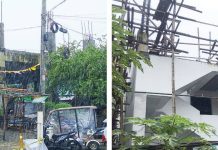
SEPTEMBER 21 is no ordinary date. It marks 53 years since Martial Law was declared, when silence was enforced and fear was law.
Now, the call is different: to show up, not in fear but in fairness. The “Trillion Peso March” yesterday was not nostalgia for the barricades, nor was it partisan theater. It was a plain request in public view: Ipakita ang resibo. With nearly ₱1.9 trillion funneled into flood control projects over the years, it is time to ask: where did it go, and why are we still wading?
This is not about floods alone. It is about patterns. Projects inaugurated with tarpaulins but left half-baked. Budgets disbursed on paper but evaporating before they reach gravel and steel. Citizens who pay twice—first through taxes, then through lost time, lost wages, or lost lives. A jeepney driver waits longer at a terminal because traffic stalls where drainage should have worked. A nurse paddles through knee-deep water to get to her shift because a dike was done only “on schedule,” not in substance. These are not acts of nature—they are the predictable costs of letting governance leak.
The march was timed well. In Congress, hearings focus on a few contractors but dodge the bigger rot: a system where shortcuts, kickbacks, and “pwede na” culture thrive. International studies are blunt. Transparency International estimates up to 30–40 percent of infrastructure budgets worldwide disappear into corrupt practices. The Asian Development Bank warns that such leakages magnify the damage of disasters. Every peso lost upstream multiplies misery downstream. Yet, these numbers are not just statistics—they are waist-high water in streets labeled “flood-free.”
But let’s be clear: this march was not an angry riot but a walk of receipts. White shirts, open books, and pointed questions. Where are the contracts? Why were costs padded? Who signed off on substandard work? Why are the same players rewarded again and again? These are household questions. Anyone who has hired a plumber, built a sari-sari store, or repainted a roof knows to check receipts and inspect results. Civic life should be no different.
The resistance to transparency often hides behind complexity. Officials wave folders of technical jargon, as if drainage calculations and cubic meters are beyond the public’s grasp. But we are not fools. Barangay health workers know when medicine stocks don’t match supply lists. Farmers know when fertilizers are overpriced. Engineers know when cement bags fall short. A march simply collects these private suspicions and places them, together, on the street. It replaces murmurs with presence.
And presence matters. The Million People March in 2013 proved it. The so-called EDSA II in 2001 proved it. People Power in 1986 proved it. Even small town actions have forced mayors to disclose reports or re-bid projects. What changes is not just policy but posture. Leaders who see citizens awake act differently from those lulled by silence. The flood walls may not rise overnight, but walls of impunity can start to crack.
Humor will play its part. Pinoys seldom march without wit. Expect placards saying “Resibo o resign,” “Drain the drains, not funds,” “Taxpayers deserve receipts,” “Pag-asa, hindi pa-asa,” “Kurakot, meet same,” “Paper trail, not tall tales,” or “Flood projects, not pockets.” Some students are already joking about forming a “Tape Measure Club” to check project lengths. This is civic humor at its best—sharp but not hostile, serious without being stiff. In a culture often numbed by scandal fatigue, humor keeps participation human.
Still, some ask: what’s the point if leaders ignore us? The point is continuity. Democracies decay not in one theft but in tolerated habits. A march disrupts that tolerance. It tells officials: we are watching, we remember, and we will return. The date, September 21, deepens that message. At the backdrop of the erstwhile Martial Law, it recalls the danger of unchecked power, when silence was weaponized. By walking, we reverse that memory—we turn silence into voice.
Many of us will not join as a politician but as workers, parents, Filipinos tired of explaining to children why the water still rises. We think of accountants who reconcile ledgers by day but wonder at night if national books are cooked. We think of commuters who budget every peso but must pay hidden taxes through lost hours in traffic. We think of flood victims who rebuild each year as if resilience were a virtue, when in fact it is a cover for corruption. Their questions deserve daylight, not whispers.
Yesterday, September 21, the streets hosted those questions. We marched in the different parts of the country not to topple, but to tally. Not to shout, but to show. We carried no weapons—only receipts, humor, and memory. Martial Law taught us what silence costs. Corruption teaches us what vigilance neglects. This march teaches us something simpler: that dignity comes from asking, together, for proof. Floodwaters may keep rising, but so too can public honesty—if we demand it, step by step.
***
Doc H fondly describes himself as a ”student of and for life” who, like many others, aspires to a life-giving and why-driven world grounded in social justice and the pursuit of happiness. His views do not necessarily reflect those of the institutions he is employed or connected with./PN







